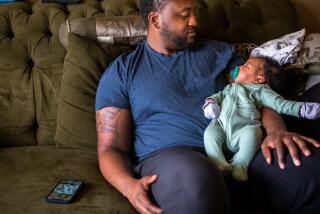At-Home Dads: a Great Option for Child Care
- Share via
With all the attention to the celebrated nanny case in recent days, I have an important perspective on child care. When I decided to become a stay-at-home dad seven years ago--I had a home-based business--most people lamented what my children would miss by not having their mother home to care for them. They seem never to have given thought to the idea that my three children, Grant, 9, Wesley, 7, and Matthew, 4, would benefit from having their dad as the stay-at-home parent. My wife, Tina, is a speech and language pathologist for the Irvine Unified School District.
Their well-intended comments came as a result of society’s culturally shared understanding of mothers in the child-care role. Whereas motherhood affords an instant identity with the nurturance of a child, fatherhood does not.
There exists an undeniable bond that develops during pregnancy between mother and child that a father cannot match. But I’m one of over 2 million stay-at-home dads in America who have proven that the biological advantage a mother has with a baby does not necessarily translate into an emotional advantage. Evidence to support that fathers can provide the same quality of nurturing care as a mother is documented in Dr. Martin Greenberg’s book, “The Birth of a Father” (Continuum, 1985). Greenberg, from his own experience as a father, wrote: “Nurturing is an intrinsic aspect of fatherly behavior and thus, of being a man. It is neither borrowed from the mother nor an imitation of her behavior. Rather, it is unique in its own right and makes an important contribution to the child’s development.” This is not to suggest that nurturance is just a natural gift or ability that mothers and fathers innately possess. It calls for development, in which nurturing skills are learned and practiced, as well.
Like many mothers, I had to learn how to hold, feed, dress, calm and nurture my first child during his early childhood years. As time passed, caring for the next two children became second nature to me. And by virtue of the task itself (caring for my children), my nurturance proved equally as valuable as Tina’s nurturance--but in ways that reflected who I am as a father and not as a mother.
Examples of the benefits have been expressed by two other stay-at-home dads I’ve met via the At-Home Dads network and by the wife of a working father. Jim DiCenzo, who lives in San Diego, offers this assessment of his role as the stay-at-home parent: “I’ve noticed that my newfound relationship with my daughter will also prepare her to make sound judgments about the men she will meet and associate with in her life. As for my wife, it gives her the opportunity to pursue her professional career without feeling guilty about her role as a working mother.”
Peter Baylies of North Andover, Maine, agrees: “It’s opened the line of communications in our family. I now have a better understanding of my children’s and wife’s needs. . . . Our children also have no prejudgment on how and what roles mothers and fathers play as parents. To them, it’s all right to see Mom go to work and Dad stay home to care for them.”
Finally, there is the comment I received from a mother about my presence in the neighborhood: “I really enjoy having you around. You bring a perspective on fatherhood that I had never realized before. Thanks to you, I now understand my husband a lot better.”
In addition to the benefits for my children, wife and neighbors, I have also benefited from my role as a stay-at-home dad. Life as an at-home dad has not only helped me gain a greater respect for motherhood but also helped me appreciate the privilege of being a father.
Many people have commented that I represent their image of the perfect father figure. While I appreciate the compliment, I do not claim to be a better father than most men. Nor do I claim to be an expert on fatherhood. What I do claim, however, is to have developed an insight on fatherhood that has increased the breadth and depth of my role as a complete father.
And if I benefited from my role as a stay-at-home dad, does it not stand to reason that other fathers can benefit as well? I believe stay-at-home dads have a lot to offer society as a whole, socially and economically. Most people think of day care if mom has to work, but people should consider dads the true option of second choice.






